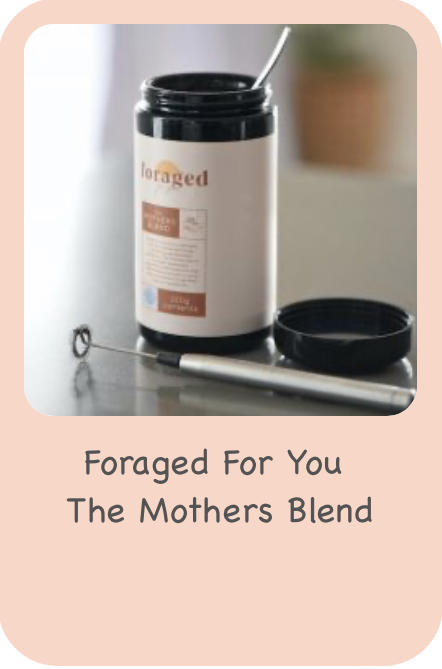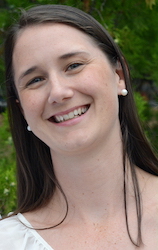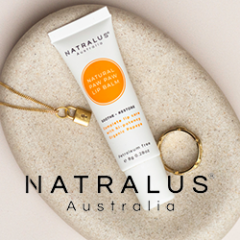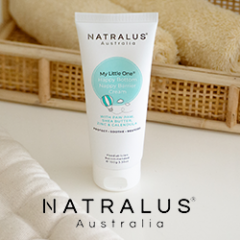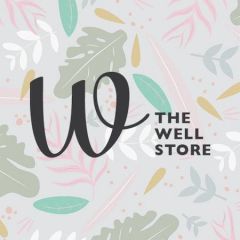Postpartum Healing Health Suitable for stages: 0 - 3 Months, 3 - 6 Months
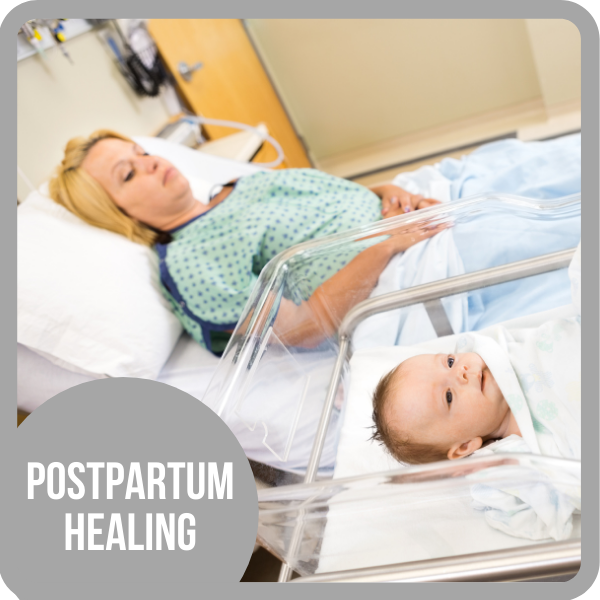

Updated 14 December 2023
The health of the whole family matters when it comes to the fourth trimester period. It is a time to regularly check in with yourself and your partner and not be afraid or shy in asking for and accessing support.
The postpartum period is a transition time where your focus is on your baby and your recovery from pregnancy and birth. Growing your baby in your womb and birthing your baby changes you in many ways right down to soul level. There is no comparison period in your life cycle where there is so much is going on. You can expect the postpartum period to be inherently challenging, in often unexpected ways. Encountering a difficult postpartum period, can feel shocking, confusing, overwhelming, exhausting and isolating. It can feel like walking through a fog where you can only see one foot at a time to tentatively take the next step. Trying to see the big picture, being kind and patient with yourself and tackling one stage and problem at a time can help you to stay positive, grounded and growing.
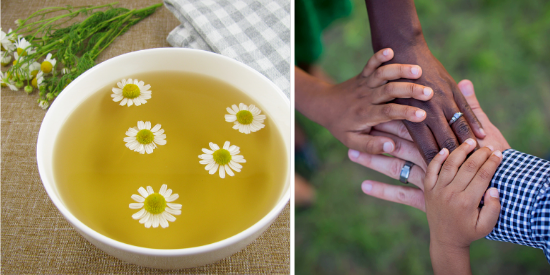
Having a baby is nothing new; it is as old as humans. In many cultures, the accumulated wisdom of what mothers needed for postpartum healing was tried, tested and protected knowledge through a treasured tradition of each generation passing down their knowledge to the next. Whilst society and technology has changed significantly; fundamental human needs have not. The traditional cultural practices and rituals that honour and support the mother in her recovery, and promote a strong bond between the mother-baby pair are gifts that modern and recent generations of mothers may be missing out on. These traditions need to be protected, remembered and embraced rather than discounted as 'old fashioned' or 'outdated'.
Looking at the traditional practices and rituals, you can see striking similarities between different cultures worldwide, as described in this article. For example, both Indian and Chinese cultures believe that the mother should be kept warm to promote healing and prevent illness. Queensland Health has an interesting summary of different cultural beliefs around the perinatal period including Indian cultural beliefs (including foods to avoid and enjoy) and Chinese ethnicity beliefs and practices, including their traditional 40-day confinement period. Other cultures have change-makers who are making huge efforts to revive the almost lost knowledge of postpartum healing practices such as from the Moroccan culture. There is no doubt that the Australian Original people had a rich culture around birthing and postpartum practices which are sadly not widely known amongst Australians.
If the cultural practices supported and expected that the postpartum period is a time of healing through rest and nutrition, I dont' expect many new mothers would object, this would come as a comfort and relief. This is especially true for those who have seen others and taken on the idea that it is normal to just bounce back into normal life like nothing has changed and practically ignoring the huge transformation that just occurred. It is perfectly natural for you to want and need someone to support you, cook for you, and hold space around you and the baby. Having this support around you has a profound physical benefit which extends for years beyond the immediate postpartum period and is hightly protective of your mental health. If you feel like you need this kind of support, but don't have someone in your life that could fill that role, check out the Doula Network Australia Directory for a postnatal doula service provider in your area.
There are many aspects to your healing during this time, but the main ones include rest, warmth and the following:
Abdominal healing
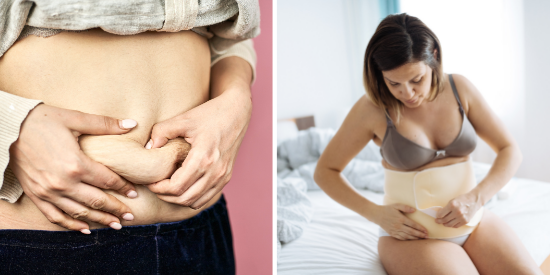
After you birth your baby, you might expect that because there is no baby, placenta and amniotic fluid in your belly, that your belly will go back to its pre-pregnancy shape in no time at all.
The reality is something different. When you think about and honour the fact that how your uterus had grown 5 x (or more) the usual size and 500 x the volume, you begin to understand that it will take time for it to shrink back at a cellular level down to its pre-pregnancy size and shape.
Abdominal and pelvic healing can be complicated by physical birth trauma, including caesarean section scars or infection, perineal tears, labial tears, episiotomy pain, pelvic floor muscle injury, and/or Pelvic Organ Prolapse. In this way, each post-birth recovery period will be different and unique. In other words, it is certainly not helpful to compare yourself with others in your friends or family group and especially with others in your mother's group!
Some cultures practise belly binding for the abdominal region's comfort and support (like a hug) to keep the organs in place whilst the muscles heal. This can be done with a long fabric piece (you can use a woven wrap or Rebozo) and wrapping it in a particular way around your pelvis, hips and belly. You can also buy a pre-fab fitted option such as the Postpartum compression & Support products from The Memo or Postpartum belts from Amazon Au.
You will find your maternity underwear is still comfortable for some time after birth, otherwise you can try underwear in a larger size or relaxed fit. You will still need some good maternity pads (disposable or reusable options) or organic Maternity pads or go for a discreet, disposable pant with a high absorbency. A protective bed pad/liner can also help protect surfaces such as your bed or chairs from any leaks. Another option is to try supportive tights either with or without leak-proof absorbency. Check out Modibodi and Emamaco for great options.
Shop all Postpartum Recovery at The Memo
Nourishing foods
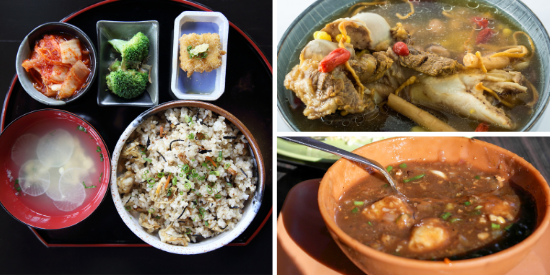
Your body has just gone through 9 months of prioritising nutrients to your baby via the placenta, gone through the marathon of birth, is working on establishing a milk supply, healing any birth injuries and reconfiguring your uterus and body shape back to pre-pregnancy status. All this bodily activity needs nourishing foods and nutrients with plenty of respectful treatment. You should be amazed at what your body has done and give it the time it needs to adjust once more. Special attention has traditionally been given to nutritious food in the initial 40-day postnatal period, including warm or hot foods such as:
- Special soups and casserole-style meals made with beans, meat including chicken (or vegetarian options), chicken or beef broth, and rice/other grains. These foods are typically rich in calories and fats.
- Lactation-boosting teas
- You can also treat yourself to the various lactation products on the market which help to boost your energy levels and promote recovery as well as milk supply. Milky Goodness has a great range of lactation products including cookies, brownies, bliss balls, granola and drink mixes.
- If you haven't discovered the Mothers Blend by Foraged For You before now, this is also a must have to boost postpartum energy levels and nutrition.
For more information and recipes for postpartum foods, you can get information from fourth-trimester, postpartum and postnatal care books such as:
- The First Forty Days - The Essential Art of Nourishing the New Mother by Heng Ou, Amely Greeven & Marisa Belger
- Mama's Menu - Ayurvedic Recipes for Postpartum Healing by Ameya Duprey
- The Postnatal Cookbook - Simple and Nutritious Recipes to Nourish Your Body and Spirit During the Fourth Trimester by Jaren Soloff
Positive Mental Health for Mum
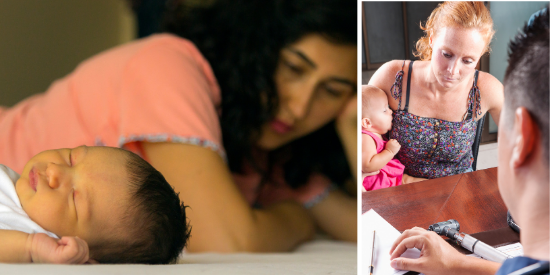
It can be a complex time of hormonal changes for the mother, body changes, lack of sleep, worry, learning curves, and emotional ups and downs. A traumatic or complicated birth experience can leave you feeling weak, sore, tired, and with psychological birth trauma, including difficult feelings and post-traumatic stress disorder. Your support network may not know how to support you in the ways you need or actively listen while you debrief and work through your emotions. It is important not to delay seeking support when you recognise that you may need it, such as from PANDA or the Australasian Birth Trauma Association (ABTA). You have nothing to lose by seeking help and everything to gain.
You can do plenty of things in your daily life to shift your perspective when you are stuck in negative self talk and low mood. Sleep can do wonders for your mood as your first priority. The next priority to help you to keep you healthy in body, mind and spirit is to engage in daily practices such as gratitude, intentional controlled breathing, mindfulness, social connectedness and physical activity.
Some useful resources to get you started and help you along, include:
PANDA has been supporting individuals and families to recover from perinatal anxiety and depression for 35 years. PANDA’s National Perinatal Mental Health Helpline is Australia’s only free, national helpline service for women, men and their families affected by perinatal mental illness. The Helpline provides a safe and confidential space for any new or expecting parent struggling with the challenges of becoming a new parent. - 1300 726 306 (9am – 7.30pm Mon-Sat(AEST/AEDT))
MumSpace is Australia’s new one-stop website supporting pregnant women's mental health and emotional well-being, new mums, and their families. MumSpace is designed to connect you quickly with the level of support you need, from advice and support in the transition to parenthood, to effective online treatment programs for perinatal depression and anxiety. The resources on MumSpace will help you ‘step-up’ to whichever level of support suits you best. MumSpace is also a resource for your healthcare professional.
Gidget Perinatal Support Centre Powered by Sonder is a 24/7 safety and wellbeing support service, linking expectant and new parents to a dedicated support centre via an app. All expectant and new parents who reside in NSW, as well as all Gidget Foundation Australia NSW clients, are offered access to Sonder. Check out their website for information about downloading the app and how to get started.
Headspace has plenty of free resources for everybody to learn mindfulness and have resources for parents as well. They do require a subscription to access their entire library, but there is plenty of free resources to get you started.
Mind The Bump - is a free Mindfulness Meditation App to help individuals and couples support their mental and emotional wellbeing in preparation for having a baby and becoming a new parent.
Mindful Parenting Family Tool Kit is a pdf resource developed by Mindfulness Everyday, a charitable organisation based in Canada. It was created to help parents and children to bring mindfulness into their life.
Birth Injury Justice Centre - The US-based Birth Injury Justice Center is dedicated to supporting children and families who have been affected by disabilities caused at birth. They offer support resources for birth-related Cerebral palsy and Erb's Palsy disabilities. Their organization strives to provide answers and guidance to ensure that families receive the assistance they need to help improve their overall quality of life.
Positive Health for Dad
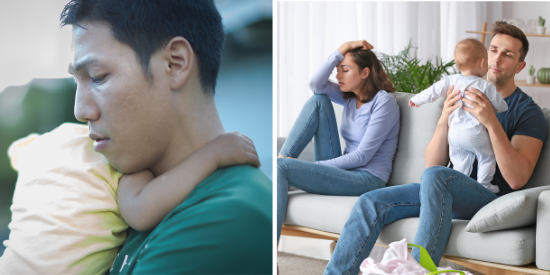
When it comes to dads or partners' health, their experience can often be overlooked as they don't go through as many physical changes as their partner. They certainly do experience a huge life transition as well as physical changes to their hormones and brain. Dads can also be very sensitive to the emotional shifts in their partner which will bring up different emotions, reactions and relationship dynamics.
One in ten dads experience a mental illness in their journey to becoming a Dad, and every Dad will experience difficult feelings related to becoming a Dad. Becoming a Dad may bring up childhood memories and triggering feelings including a reflective period where their own relationship to their Father and Mother will be front of mind. They may never have acknowledged or been aware of these feelings before being confronted with and placed in the role of being a father themselves. Having open conversations with honesty, vulnerability and without judgement with a partnership mindset can certainly help both of you through this time, bringing you closer together. It's a wonderful opportunity to seek counselling individually or as a couple to grow with self-compassion and self-love.
In recognition of the father's journey, there are several resources out there for dads:
How is Dad Going? Website by PANDA offers emotional and mental health support & info for new and expecting dads. Reaching out for help or more information is not a failure. It’s a WIN.
Australasian Birth Trauma Association (ABTA) website offers information, support and advocacy, including their Peer2Peer Support Program. They have resources for mums, partners & fathers and family & friends.
The Raising Children's Network - Resources for fathers
The Australian Institute of Family Studies - Resources for fathers
A great book which explores the experience of parenting is the Circle of Security courses and book which is well worth exploring in print or as an audiobook.
A lot is going on in the postpartum period, but there's nothing you can't get through with the right mindset, support, and enough time. Be kind to yourself, and if you don't want to get out of your pyjamas all day, you don't have to. Prioritise what is most important and lower your expectations of what you can 'achieve'. New parent 'achievement' has a different set of rules from everyday life, where the wins include, everyone being fed, watered, and comfortable. Anything else is a bonus!
Written by Anna Noud
Anna is a mother of 2 boys and an Occupational Therapist, holding a Bachelor of Occupational Therapy with Honours from the University of Newcastle, NSW, Australia. A lifelong learner with a passion for everything health-related and a drive to improve the lives of Mothers and the babies who will be the leaders of our future. The most important assets we have in this life is our health, well-being, and happiness. Writing for BabyPeg is a passion project alongside life tripping in the caravan, parenting, and working as an OT to help people with disabilities fulfill their potential. Find me on LinkedIn or message me through the BabyPeg Facebook page.
Please note: Above all, any information on this website aims to provide general ideas for informational and educational purposes only. We encourage users to investigate several information sources, including, where necessary, independent individualised medical advice before making any decisions that could affect you or your child’s health or wellbeing.
* BabyPeg participates in various affiliate programs and may earn a commission for referring our users through the links provided. This is at no additional cost to our users. We take great care in choosing products and services which align with the mission of promoting better health and wellness for our BabyPeg community. Where possible, products are tried and tested by us. To continue to provide BabyPeg as a free service and reach as many parents as possible, we appreciate your support in using the link provided to purchase if you decide the product is right for you.

